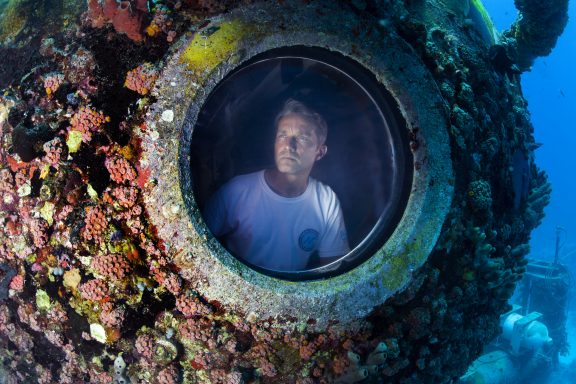Multi-Media Presentation by Fabien Cousteau

Mr. Cousteau is Founder/President of the Cousteau Ocean Learning Center. First grandson of Jacques-Yves Cousteau, he is also an aquanaut, documentary filmmaker, and conservationist.
Mr. Cousteau began with enthusiastic praise for the world’s youth. “Young people don’t know the word ‘impossible’,“ he said, encouraging them to keep the previous generation on the straight and narrow. He then addressed the question “Why are we here?”
The ocean, of which only 5% has been explored, is the driving factor for why we exist. It represents ¾ of the world’s surface area, and 99% of our living space, which 95% of the planet’s biodiversity call home. He spoke of a symbiotic relationship between humans and aquatic animal life, and the challenges we’ve created for them. 70% of aquatic life is dependent on coral reefs, the cities of the sea, and 60% of coral reefs, which may hold cures for malaria and cancer, are bleaching out. He quoted his grandfather, Jacques Yves Cousteau, former director of the Oceanographic Institute in Monaco, who said in 1956, “For most of history man has had to wage war on Nature in order to survive; now, to exist, we must protect it. People protect what they love, love what they understand, and understand what they’re taught.”
He suggests 3 approaches to teaching and protecting the environment:
- See what’s going on and share knowledge around the world
- Learn through the STEAM curriculum – Science, Technology, Engineering, Architecture and Mathematics
- Do restoration projects
His Ocean Learning Center (OLC) provides for communities at risk by cleaning beaches, building hatcheries to restore the sea turtle population in El Salvador from trafficking in sea turtle eggs, and planting mangroves in the Miami/ Ft. Lauderdale area and the Florida Keys. Mangrove roots serve as a nursery for a variety of invertebrates and juvenile fish. OLC also uses calcium carbonate and new technology for 3-D printing of coral reefs to replace lost coral, and promotes Citizen Scientist groups of volunteers.
In a Q&A he was asked, “What is the single most important thing we can change now? “Plastics,” he replied. One million pounds are dumped in the ocean every day, and on average, every person uses 8 single use pieces of plastic daily. We must stop making things of plastic (straws, for example) that we use only 30 minutes or less, yet which last 500 years. 50% of fish show signs of microplastics in their bodies, and so, when we eat fish, we’re gambling on eating our own garbage.
As part of his presentation, he showed a video of the Center’s work – entitled One Ocean, One People – Our Unique Oasis in Space. OLC creates educational resources for schools, from elementary to universities, as well as museums and other institutions, and sponsors events for high school and college students. Inquire at www.fabiencousteauolc.org

